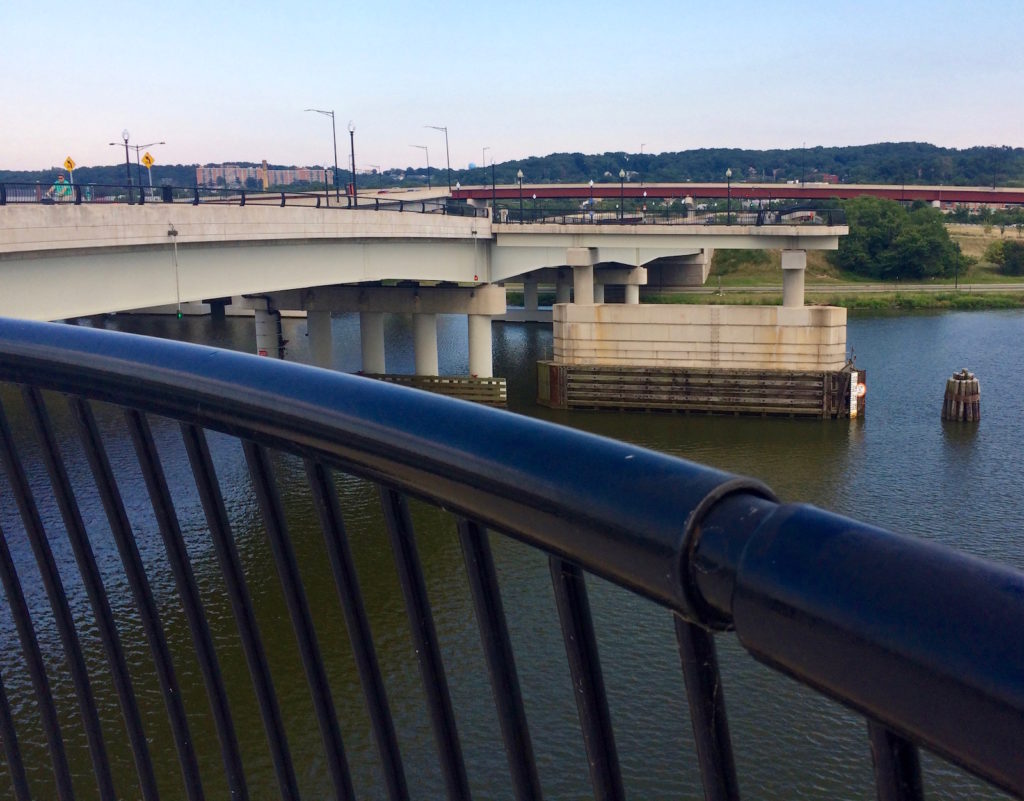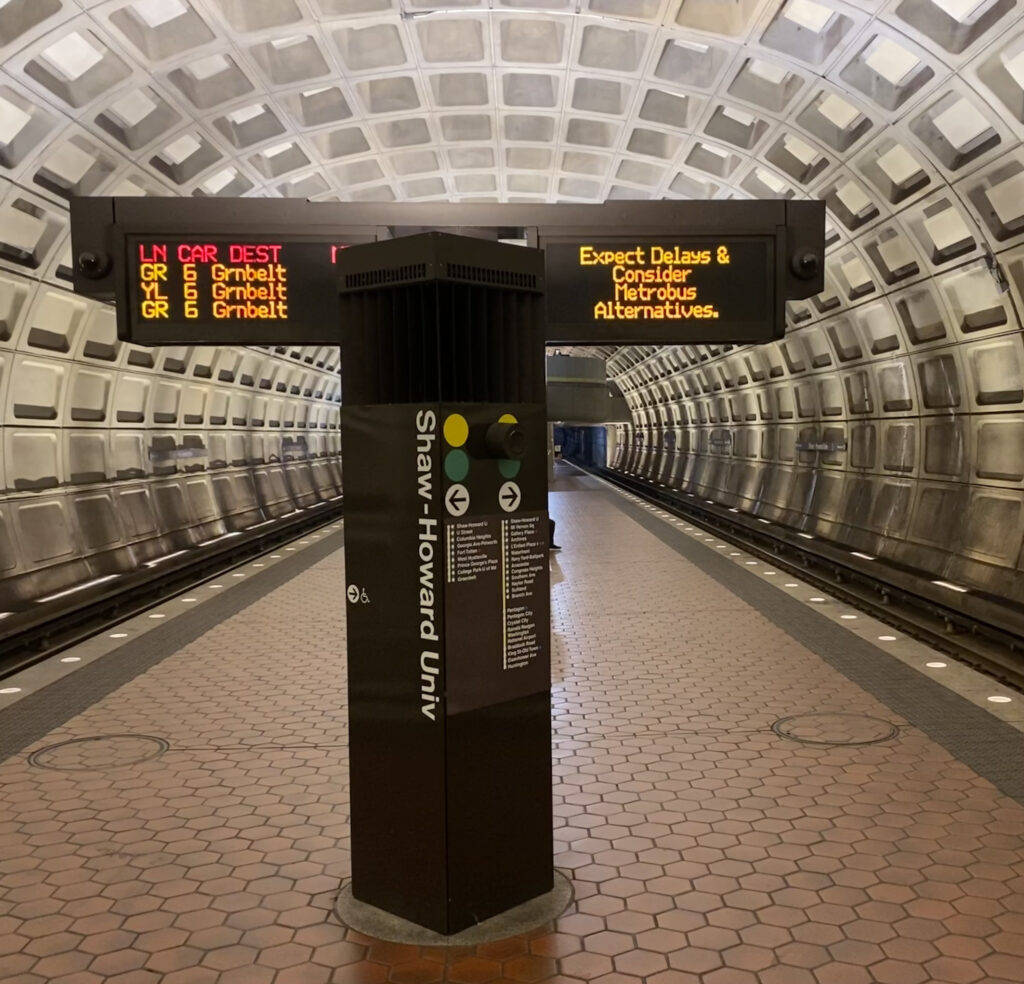D.C. residents and visitors are one step closer to a pedestrian-friendly walk from Navy Yard and Capitol Hill to historic Anacostia and Fairlawn without cars whizzing alongside them — via Washington’s first elevated public space, a park that will span the Anacostia River. Exelon, Pepco’s parent company, announced a $5 million gift last monthto the Ward 8 nonprofit Building Bridges Across the River (BBAR), which heads the 11th Street Bridge Park project.
“The beauty of this bridge is, not only will it connect us to Capitol Hill, but … it will heal our communities,” said Brenda Richardson, a Ward 8 resident involved in the planning. “There’s great trauma on our side of the river, and we are looking for some happiness and some joy.”
Slated for a 2023 opening, the 11th Street Bridge Park will create a pedestrian-only expanse across the Anacostia River, including space for public art, community meetings, an amphitheater, a hammock grove, a cafe and restaurant, and kayak and canoe launches. The park is planned to be the length of three football fields, and 120 to 130 feet at its widest point.
[Read more: A Surgical Procedure: The 11th Street Bridge Park Project]
The project is part of the High Line Network, a set of infrastructure-reuse concepts in U.S. cities that started with New York City’s High Line and now includes the Atlanta BeltLine and the Philadelphia Rail Park, among others. The D.C. park will be built upon the pillars of an earlier bridge that was replaced as part of a District Department of Transportation project to improve the vehicular connection between the Navy Yard area and historic Anacostia. The two-phase 11th Street Bridge construction project, which began in 2009 and was completed six years later, provided a new 14-foot-wide pedestrian and bicycle path beside a local roadway as well as direct connections between the Southeast-Southwest Freeway and Interstate 295.
But proponents of the 11th Street Bridge Park tout an opportunity for greatly enhanced connections immediately to the south of the current bridges.
With the new gift, the 11th Street Bridge Park project has reached $111.5 million of its $139 million capital campaign goal — a budget developed to cover future costs as well as community amenities beyond the park’s footprint. The D.C. Department of Transportation has dedicated $38.25 million of the estimated $74 million cost for construction for the park.

11th Street Bridge. Photo by Chris Kain, courtesy of the DC Line
BBAR’s capital fundraising goals also include $10 million for management of the park after it opens and $55 million in “equitable investments” in the communities around the bridge. Scott Kratz, director of BBAR’s 11th Street Bridge project, emphasized that the organization is looking for ways to give back to the community.
Residents of wards 6, 7 and 8 will have priority for jobs at the park during and after construction, and the park will host programs in collaboration with artists and performers from the local neighborhoods, according to BBAR. Kratz said the organization has provided low-interest loans and technical assistance to local small businesses and has partnered with the Washington Area Community Investment Fund to ensure that local stakeholders benefit from the park’s construction.
The organization also helped set up the Douglass Community Land Trust to preserve affordable housing in areas near the park. According to BBAR, a recent economic impact study by a real estate consulting firm found that property values near similar park projects in other cities increased by 5 percent to 40 percent. Kratz said the land trust has an executive director, a 10-year business plan and $3 million to $4 million for property acquisition that can preserve an estimated 750 units of affordable housing.
Most recently the land trust partnered with the residents of the 65-unit Savannah Apartments in Congress Heights. In 2017, renters there exercised their rights under the Tenant Opportunity to Purchase Act to buy the property with the help of the National Housing Trust, a nonprofit developer. A $700,000 grant and $600,000 interest-free loan distributed by the Douglass Community Land Trust have ensured the tenants can keep their units affordable after much-needed renovations are complete.
[Read more: A new park is expected to drive up housing prices in Ward 8. Could a land trust prevent that?]
Community involvement has been crucial in planning the 11th Street Park Bridge project. Kratz said over 1,000 community meetings have been held since 2011 to sort out details ranging from the design to how long the park will remain open each day. Richardson said Kratz has become well-known in Ward 8 for meeting with residents one-on-one in their homes to talk about the project.
Thanks to Exelon’s gift, the 11th Street Bridge Park will now include an Environmental Education Center on the Anacostia side managed by the Anacostia Watershed Society and powered by solar panels from Constellation, a solar energy firm owned by Exelon. The center will host lectures and film screenings for up to 90 schoolchildren at a time and feature “learning gardens” with local plants and animals.
James Foster, president of the Anacostia Watershed Society, called the bridge project the “Arc de Triomphe” of the broader Anacostia restoration project, an ongoing effort since 1990 to improve the river’s quality and add cultural and recreational amenities.
[Read more: Trayon White Celebrates ‘Inclusive Development’ Across the Anacostia]
Thanks to the river’s continuing restoration, Foster said, residents are “tantalizingly close” to being able to swim in the Anacostia River, with opportunities to fish safely not far behind.
Exelon’s donation also opens the door for collaboration between the energy company and BBAR on green energy features for the park. Exelon is considering electric vehicle charging stations, energy-efficient “smart lighting” and clean energy workforce development programs.
Kratz said BBAR and the city’s Transportation Department hope to break ground on the bridge park project in 2021, with construction expected to take about two years.
This article was co-published with TheDCLine.org






